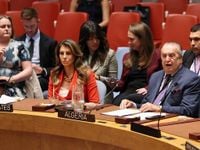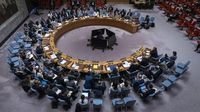On September 18, 2025, the United States stood alone in the United Nations Security Council, wielding its veto power for the sixth time to block a resolution demanding an immediate, unconditional, and permanent ceasefire in the Gaza Strip. The vote came during what was supposed to be a landmark occasion—the Council’s 10,000th meeting—yet the mood was anything but celebratory. Instead, the session was marked by somber reflections, angry rebukes, and a growing sense of global frustration as the humanitarian crisis in Gaza deepened and diplomatic efforts faltered.
The draft resolution, crafted by the Council’s ten non-permanent members—Algeria, Denmark, Greece, Guyana, Pakistan, Panama, Republic of Korea, Sierra Leone, Slovenia, and Somalia—called not only for a ceasefire, but also for the unconditional release of all hostages held by Hamas and other groups, and the lifting of all restrictions on humanitarian aid entering Gaza. Fourteen of the fifteen Council members voted in favor. Only the United States, one of the five permanent members with veto authority, stood in opposition.
Washington’s stance was articulated by Morgan Ortagus, the US deputy special envoy to the Middle East. Speaking before the vote, Ortagus declared, “US opposition to this resolution will come as no surprise. It fails to condemn Hamas or recognize Israel’s right to defend itself, and it wrongly legitimizes the false narratives benefiting Hamas, which have sadly found currency in this council.” She further argued that the resolution “refuses to acknowledge and seeks to return to a failed system that has allowed Hamas to enrich and strengthen itself at the expense of civilians in need.”
Ortagus also cast doubt on the international community’s assessment of the humanitarian emergency. She criticized the UN-backed Integrated Food Security Phase Classification’s official declaration of famine in Gaza, calling its methodology “flawed.” She praised the heavily militarized humanitarian hubs, where many Palestinians have been killed while seeking food for their families, as evidence of ongoing efforts despite the dire situation.
The facts on the ground, however, paint an increasingly grim picture. According to Gaza health authorities, more than 65,000 Palestinians have been killed since hostilities erupted on October 7, 2023. That day, Hamas and other Palestinian militant groups launched a surprise assault on Israel, killing roughly 1,200 people and taking 251 hostages. As of September 2025, 48 hostages remain in captivity. The war has also claimed the lives of more than 18,000 children and 12,000 women, over 1,400 medical personnel, and more than 250 journalists, according to Palestinian officials.
The humanitarian crisis has reached catastrophic levels. The UN’s humanitarian office has warned that the last lifelines for civilians are collapsing as Israeli tanks and troops expand their offensive into Gaza City. Thousands have fled in recent days, and the territory’s health ministry reports that 435 people have died from malnutrition and starvation during the war, including four in the 24 hours leading up to the Security Council vote. Danish Ambassador Christina Markus Lassen described the devastation in stark terms: “Desperate mothers are forced to boil leaves to feed their children, fathers search the rubble for sustenance. People are killed as they try to get food to survive. A generation risks being lost not only to war, but to hunger and despair.”
The international community’s frustration was palpable in the Council chamber. Palestinian Ambassador Riyad Mansour called the US veto “deeply regrettable and painful,” adding that it had prevented the Security Council from “playing its rightful role in the face of these atrocities and to protect civilians in the face of genocide.” He continued, “I can understand the anger and frustration and disappointment of the Palestinian people who might be watching this session of the Security Council, hoping that there is some help in the pipeline and this nightmare could be brought to an end.”
Algerian Ambassador Amar Bendjama offered an emotional apology to the Palestinian people, saying, “Palestinian brothers, Palestinian sisters, forgive us. Forgive us, because the world speaks of rights, but denies them to Palestinians. Forgive us because our efforts, our sincere efforts, shattered against this wall of rejection.” Pakistan’s ambassador Asim Ahmad described the veto as “a dark moment in this chamber,” urging, “The world is watching. The cries of children should pierce our hearts.”
On the other side, Israeli Ambassador Danny Danon thanked the United States for its support and insisted that Israel needed “no justification” for its war on Gaza. He argued that the Security Council’s proposed resolution would “not free the hostages nor bring security,” and vowed that Israel would “continue to fight Hamas and protect its citizens, even if the Security Council prefers to turn a blind eye to the terror.”
The US’s repeated use of the veto has left it and Israel increasingly isolated on the world stage. According to BBC reporting, even as the US insists on Israel’s right to self-defense, many of its closest allies are moving in a different direction. The latest vote came just days before the annual UN General Assembly, where Gaza is set to dominate the agenda and several major US allies are expected to recognize an independent Palestinian state—a move vehemently opposed by both Israel and the US.
Meanwhile, the war continues with no clear end in sight. The Israeli military’s ground offensive on Gaza City, which began on September 16, 2025, appears poised to last for months, with no specific timeline given. Independent experts commissioned by the UN Human Rights Council concluded on September 16 that Israel is committing genocide in Gaza, with intent to “destroy” the Palestinian people—a charge Israel vehemently denies.
South Korea, holding the rotating Security Council presidency for September, attempted to strike a note of reflection. Representative Sangjin Kim reminded the Council that 137 Member States have served on the body over the years, often working together. “Let us bear this in mind as we continue to strive to fulfill the Security Council’s vital mandate,” he said, referencing the Council’s responsibility for maintaining international peace and security.
Yet, as the Council adjourned its 10,000th meeting, the sense of impasse was unmistakable. For many, the vote underscored not just the divisions within the Security Council, but the profound challenges facing the international system as it grapples with one of the worst humanitarian crises of the 21st century. As the world’s attention turns to the upcoming General Assembly, the question remains: what, if anything, can break the deadlock and bring relief to Gaza’s suffering population?
The events of September 18 were a stark reminder of the limits of diplomacy in the face of entrenched conflict and the tragic consequences when consensus cannot be found.





